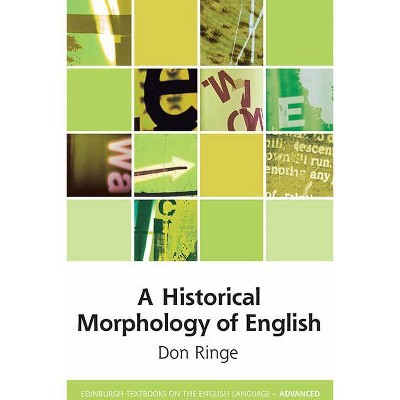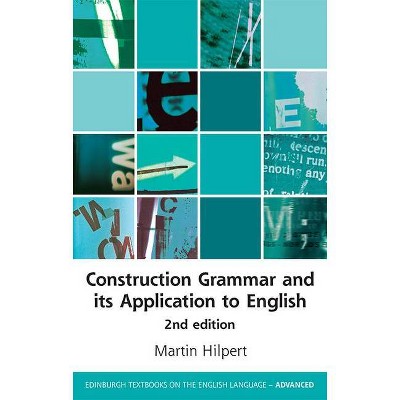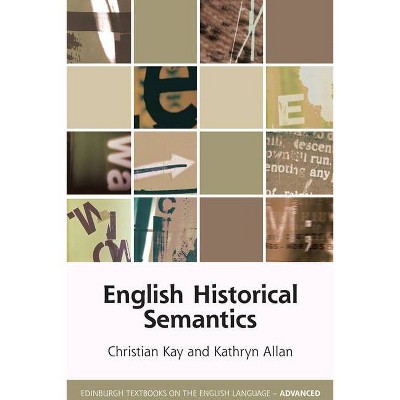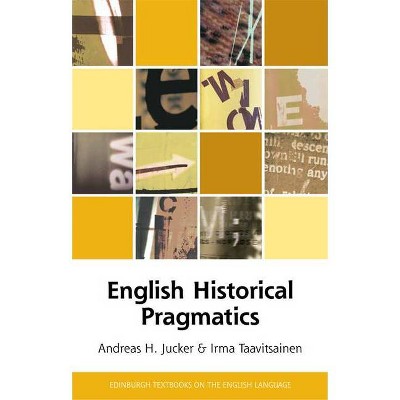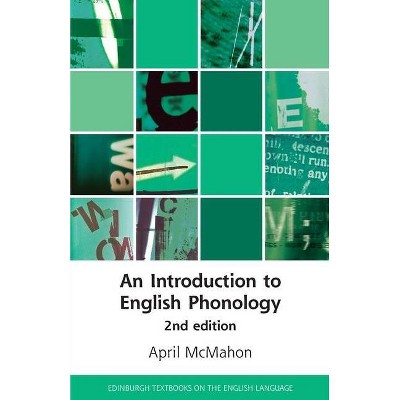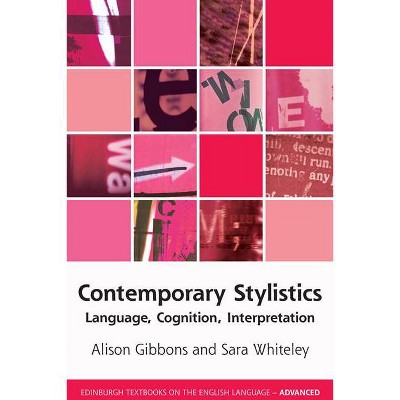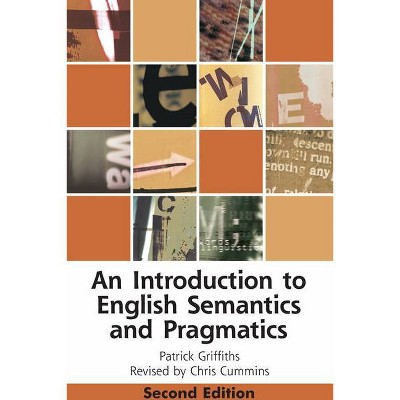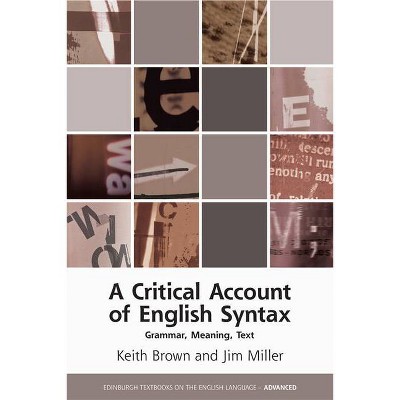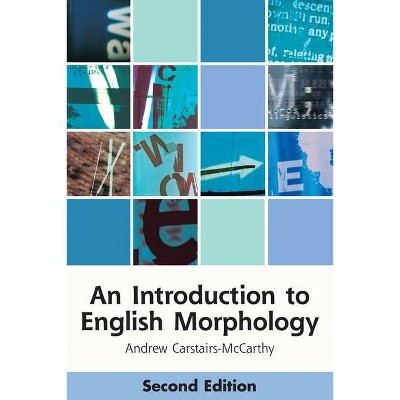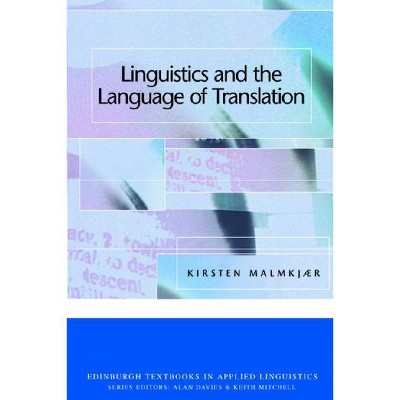Corpus Linguistics and the Description of English - (Edinburgh Textbooks on the English Language - Advanced) 2nd Edition (Paperback)
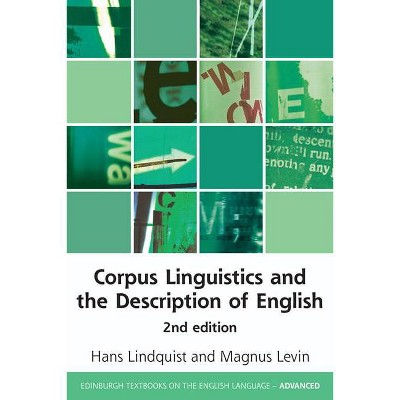
Similar Products
Products of same category from the store
AllProduct info
<p/><br></br><p><b> About the Book </b></p></br></br>An introduction to corpus linguistics for students of English language.<p/><br></br><p><b> Book Synopsis </b></p></br></br><p>A lively hands-on introduction to the use of electronic corpora in the description and analysis of English - revised and updated. After introducing corpora and the rationale and basic methodology of corpus linguistics, the author presents a number of recent case studies providing new insights into vocabulary, collocations, phraseology, metaphor and metonymy, syntactic structures, male and female language, and language change. In a final chapter it is shown how the web and social media can be used as a source for linguistic investigations as well as including a section on creating your own corpus. Each chapter includes new study questions, exercises and updated suggestions for further reading.The second edition of this successful text provides an ideal introduction for university students of English at the intermediate level. Students planning papers, dissertations or theses will find the book a particularly valuable guide.</p><p/><br></br><p><b> From the Back Cover </b></p></br></br>Praise for previous edition: "An excellent book for anyone wishing to become acquainted with corpus linguistics and its wide range of applications." Marlies Gabriele Prinzl, LINGUIST list "...offers informative and exciting step-by-step analyses that demonstrate how to use electronic corpora and what linguists can do with the results." Stacey Wizner, Qatar University, Corpora A lively hands-on introduction to the use of electronic corpora in the description and analysis of English - revised and updated Key features include: - New coverage on social media, DIY corpora and ethical concerns - New material on metonymy and pragmatics - Updated example investigations, corpus exercises and study questions - Examples of how to create your own corpus data - Information on new corpora with accompanying links The second edition of this successful text provides an ideal introduction for university students of English at the intermediate level. Students planning papers, dissertations or theses will find the book a particularly valuable guide. After introducing corpora and the rationale and basic methodology of corpus linguistics, the authors present a number of recent case studies providing new insights into vocabulary, collocations, phraseology, metaphor and metonymy, syntactic structures, male and female language, and language change. A final chapter shows how the web and social media can be used as a source for linguistic investigations and contains information on how to compile your own corpus. Each chapter includes study questions, exercises and updated suggestions for further reading.<p/><br></br><p><b> Review Quotes </b></p></br></br><br><p><em>Corpus Linguistics and the Description of English</em> is a practical textbook that provides a vivid introduction to the field of corpus linguistics and the description of English... For anyone looking to do some hands-on investigations on language using existing corpora, this book can only be highly recommended. This textbook is a valuable addition to existing literature on corpus-linguistic methods of research and contributes greatly to making corpus linguistics more approachable to students.</p>--Stephanie Ullmann "Corpus Pragmatics"<br><br><p>The updated edition of <i>Corpus Linguistics and the Description of English</i> makes an outstanding introductory book on corpus linguistics. It covers the most important basics of corpus linguistics methodology in a highly accessible way, and illustrates the applications of corpus linguistic analysis in some of the most prominent areas of English language description in a nontechnical manner. The study questions, hands-on exercises, and further reading provided at the end of each chapter dramatically improve its suitability as a textbook for a first course on corpus linguistics for undergraduate and master's students in English language and literature. Readers of the first edition will also find the new edition decidedly superior, with its new coverage of social media, DIY corpora, and ethical concerns, new materials on metonymy and pragmatics, comprehensive information on new corpora, and numerous updated example investigations, exercises, and study questions.</p>--Xiaofei Lu "Journal of English Linguistics"<br><br><p>Two generations of corpus linguists teamed up for this edition, and the authors' profound expertise in research and teaching is clearly in evidence throughout, both in the concise discussion of key issues and the thoughtful methodology of exercises. Through its systematic structure, the book can easily and profitably be used as a week-by-week semester textbook or, alternatively, provides self-contained study units in specialist seminars that seek to integrate a corpus perspective.</p>--Stefan Diemer, Trier University of Applied Sciences "ICAME, Volume 44, 2020"<br><p/><br></br><p><b> About the Author </b></p></br></br><p>Hans Lindquist is professor of English Linguistics at Malmö University, Sweden. He has taught English in Switzerland, the United States, Japan, New Zealand and the Gambia and co-edited volumes on translation theory, the major varieties of English, and corpora and grammaticalization. <p>Magnus Levin is Associate Professor of Languages at Linneaus University. His research interests include change and variation in English grammar and phraseology, pragmatics and translation studies.<p>
Price History
Price Archive shows prices from various stores, lets you see history and find the cheapest. There is no actual sale on the website. For all support, inquiry and suggestion messagescommunication@pricearchive.us
